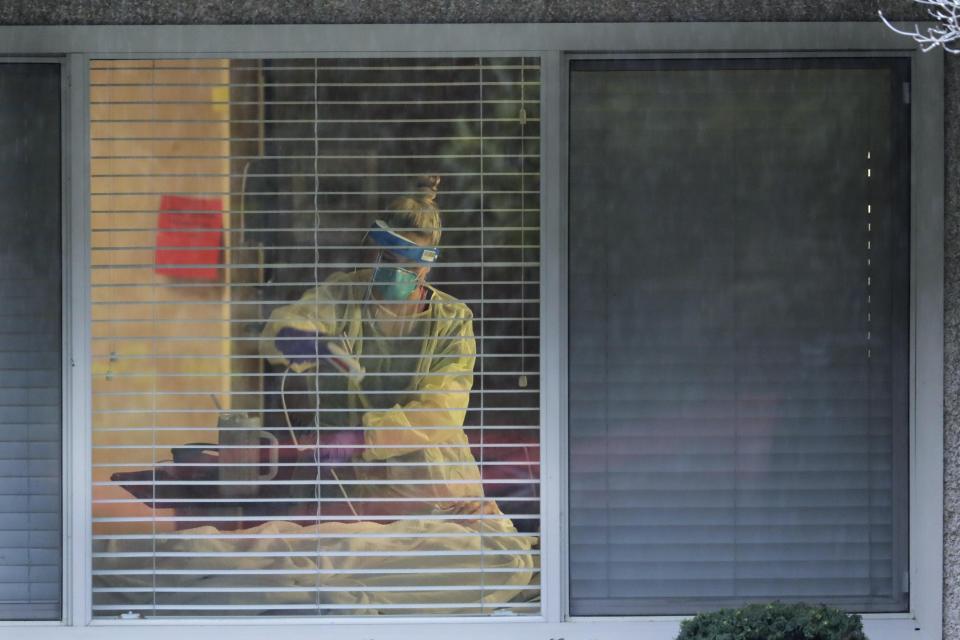Omicron spiking in nursing homes, but COVID-19 deaths minimal
The omicron variant of COVID-19 has brought yet another spike in cases, and nursing and long-term facilities have been no exception.
According to data from American Health Care Association and National Center for Assisted Living, nationwide the number of nursing home residents and nursing home staff with the coronavirus on Dec. 19 was 4,361 and 5,919, respectively. By Jan. 9, those figures dramatically increased to 32,061 and 57,243.
In New Jersey, at least 540 facilities are dealing with outbreaks as of Jan. 13, totaling 8,204 resident cases and 11,030 staff cases. Staff shortages have become so severe that facilities have sought out the assistance of the National Guard.
"The state requested and is receiving assistance from the New Jersey National Guard for more than a dozen facilities to help support current staff to ensure that there is adequate care of residents," said Donna Leusner, director of communications for the New Jersey Department of Health. "The Department’s Office of Long-Term Care Resiliency is also providing support and resources and the Department’s Communicable Disease Service and county and local Health Departments are providing guidance as part of their regular communication with long term facilities with outbreaks."
COVID in NJ: Omicron COVID variant putting strain on NJ testing resources, peak could be weeks away
Divine insights: Rowan College at Burlington County releases annual report as tarot deck
Labor shortage: Many in South Jersey struggling to find employment although 'there's jobs everywhere'
Twenty-six of those facilities are in Burlington County. Still, the county is not yet considering restrictions on visitations.
"Our Health Department is encouraging anyone who visits a long-term care facility to be fully vaccinated and boosted first and to wear a mask at all times," county spokesman David Levinsky said. "The Health Department is also encouraging visitors to avoid prolonged close contact during visits. Also, people experiencing COVID-19 symptoms should delay visits until they are get tested or their symptoms are gone."
The Laurel Brook Rehabilitation and Healthcare Center, Cambridge Rehabilitation and Healthcare Center, and The Palace Rehabilitation and Care Center have had the most severe outbreaks in the county with a combined total of 333 resident and staff cases. The Palace reported two resident deaths connected to the omicron outbreak.
In Camden County, Elmwood Hills Healthcare Center was among those hit the hardest, reporting a total of 103 combined resident and staff cases with two deaths. A comprehensive outbreak plan has also been implemented by the facility, and it includes the usual measures like screening anyone entering the building, isolation sick residents and universal masking. Additionally, any staff member who refuses testing is not allowed into the building. In the event of staff shortages, the facility is able to make use of a pool of temporary workers. It can also deploy consultant or contract workers if necessary. Restrictions have been imposed for indoor visits.

"Outdoor visits of family members and loved ones are very much encouraged and are an essential component to our residents’/patients’ emotional and physical wellbeing," the plan reads. "All outdoor family visitations are conducted in accordance with the CDC’s and NJDOH’s health and safety precautions guidelines for outdoor visitations. Indoor visitation is available for End-of-Life, Compassionate Care, and Essential Caregivers in accordance with NJDOH Executive Directive No. 20-026."
Across the state, deaths within nursing homes are significantly lower than they were during previous waves. The report from the AHCA/NCAL showed that although weekly COVID-19 cases now (32,061) are comparable to the wave in December 2020 (34,094), the weekly deaths are a completely different story (6,219 in December 2020 to 645 in January 2022).
Officials have said that the omicron variant produces symptoms less mild than those of the first wave and the Delta variant of the coronavirus. That, in addition the vaccines, may explain the low death counts.
"While omicron has only been spreading in New Jersey for a few weeks, and deaths are a lagging indicator, we have seen fewer hospitalizations and deaths per case during the omicron surge compared to earlier variant waves," Leusner said. "It is difficult to say know how much of the decrease is due to increased immunity in the population (through vaccine and/or previous infection) and how much is due to a decreased severity of omicron, but it is very likely that both factors play a role."
Ahmad Austin Jr. is a lifelong South Jersey resident telling stories within the healthcare and cannabis industries for Burlington County Times, Courier-Post and The Daily Journal. For story tips, reach out at aaustin@gannett.com.
Please support local journalism with a digital subscription.
This article originally appeared on Burlington County Times: Nursing homes handling drastic spike in COVID-19 cases

